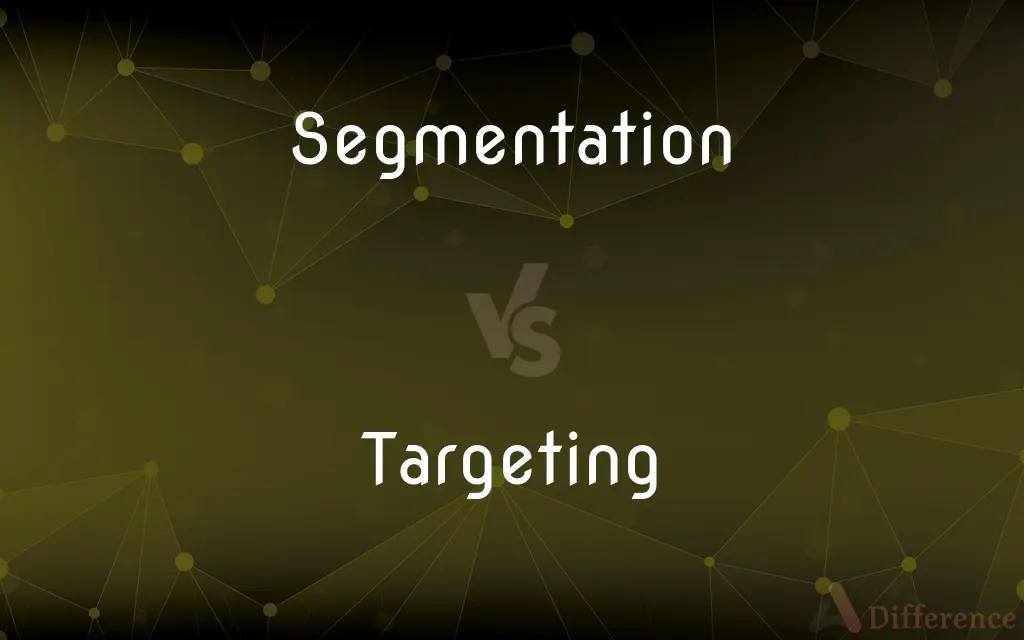Segmentation vs. Targeting — What's the Difference?
Edited by Tayyaba Rehman — By Fiza Rafique — Published on October 14, 2023
Segmentation divides a market into distinct groups based on shared characteristics. Targeting selects specific segments to focus marketing efforts.

Difference Between Segmentation and Targeting
Table of Contents
ADVERTISEMENT
Key Differences
Segmentation is the process of dividing a broad consumer market into smaller, more homogeneous groups based on certain criteria such as demographic, geographic, psychographic, or behavioral attributes. Targeting, on the other hand, involves deciding which of these segmented groups a company should focus its marketing efforts and resources.
Segmentation emphasizes understanding different consumer groups and their unique needs or preferences. By identifying these distinct groups, companies can tailor products or services more effectively. Targeting, meanwhile, is about making choices. It's about deciding which segments are the most profitable or aligned with the company's objectives and then prioritizing them.
Segmentation allows companies to recognize the diversity and multiplicity within a larger market. It acknowledges that not all consumers have the same preferences, needs, or behaviors. Targeting, in contrast, narrows the focus. It pinpoints specific segments that are most likely to respond to particular marketing messages or offers.
Segmentation provides businesses with valuable insights into their customer base. These insights can help businesses better understand the various market niches and the opportunities they present. Targeting, however, transforms these insights into action. It's about leveraging the knowledge gained from segmentation to reach the right audience with the right message.
Comparison Chart
Definition
Dividing the market into distinct groups.
Choosing specific groups to market to.
ADVERTISEMENT
Focus
Understanding customer diversity.
Prioritizing profitable segments.
Purpose
Identify potential customer niches.
Allocate resources effectively.
Outcome
Insights into customer behavior and preferences.
Enhanced marketing efficiency and effectiveness
Role in Marketing
Foundation of a marketing strategy.
Actionable strategy to engage segments.
Compare with Definitions
Segmentation
The act of dividing something into parts.
The segmentation of the market allowed for more tailored advertising strategies.
Targeting
The act of directing efforts towards a specific group or goal.
The company is targeting millennials with their new ad campaign.
Segmentation
Categorization based on shared characteristics.
Through segmentation, they identified several key demographics for their product.
Targeting
Choosing a segment to focus resources and marketing on.
After thorough research, they began targeting the urban demographic.
Segmentation
A breakdown of a whole into more manageable units.
The segmentation of tasks made the project more manageable.
Targeting
The process of aligning marketing messages to appeal to specific groups.
Targeting based on interests led to higher engagement rates.
Segmentation
Classifying based on distinct features or behaviors.
Segmentation by purchasing behavior revealed patterns in customer loyalty.
Targeting
Prioritizing certain segments over others for specific outcomes.
Targeting high-income households increased the product's profitability.
Segmentation
The process of understanding different consumer subsets.
Segmentation revealed a new audience they hadn't previously considered.
Targeting
An object, such as a padded disk with a marked surface, that is shot at to test accuracy in rifle or archery practice.
Segmentation
Division into segments.
Targeting
Something aimed or fired at.
Segmentation
(Embryology) See cleavage.
Targeting
An object of criticism or verbal attack.
Segmentation
The act or an instance of dividing into segments
Targeting
One to be influenced or changed by an action or event
Children were the target of the new advertising campaign.
Segmentation
The state of being divided into segments
Targeting
A desired goal
Achieved our target for quarterly sales.
Segmentation
The partitioning of an image into groups of pixels
Targeting
A railroad signal that indicates the position of a switch by its color, position, and shape.
Segmentation
The act or process of dividing into segments; specifically (Biol.), a self-division into segments as a result of growth; cell cleavage; cell multiplication; endogenous cell formation.
Targeting
The sliding sight on a surveyor's leveling rod.
Segmentation
(embryology) the repeated division of a fertilised ovum
Targeting
A small round shield.
Segmentation
The act of dividing or partitioning; separation by the creation of a boundary that divides or keeps apart
Targeting
A usually metal part in an x-ray tube on which a beam of electrons is focused and from which x-rays are emitted.
Targeting
(Biochemistry) A molecule or molecular structure, such as a protein or a nucleic acid, that a drug or other compound interacts with and modulates the activity of.
Targeting
To aim at or identify as a target
Targeted the airport hangar.
Targeting
To identify or treat as the object of action, criticism, or change
Targeted the molecule for study.
Targeted teenagers with the ad campaign.
Targeting
To design for or direct toward a specific object or audience
Targeted the ad campaign toward seniors.
Targeting
(Biochemistry) To interact with as a target
Drugs that target estrogen receptors.
Targeting
Involved in the transportation or correct positioning of a protein inside or outside a specific region of the cell.
Targeting
An instance of targeting.
Targeting
Present participle of target
Targeting
Deciding on the most receptive audience for a message or product.
They improved sales by targeting their promotions to repeat customers.
Common Curiosities
Can Segmentation be done without Targeting?
Yes, but without Targeting, Segmentation's insights may not be actionably utilized.
Why is Targeting essential after Segmentation?
Targeting ensures resources are focused on the most relevant and profitable segments.
What is the primary purpose of Segmentation in marketing?
Segmentation aims to divide the market into distinct groups based on shared characteristics.
Can Segmentation be dynamic?
Yes, markets change, and Segmentation may need to be revisited and updated.
What is the main risk of not Targeting after Segmentation?
Spreading resources too thin and not effectively reaching any particular segment.
How does Targeting complement Segmentation?
Targeting chooses specific segments, identified through Segmentation, to focus marketing efforts on.
Is every segment identified through Segmentation worth Targeting?
Not necessarily. Companies prioritize segments based on potential profitability and alignment with goals.
What role does Segmentation play in product development?
Segmentation can reveal unmet needs or preferences, guiding product features or innovations.
Why might companies re-evaluate their Targeting decisions?
Market conditions, segment profitability, or company goals might change.
What are common criteria for market Segmentation?
Demographic, geographic, psychographic, and behavioral are common criteria.
How does Targeting impact advertising efficiency?
Targeting directs ads to receptive segments, reducing wasted efforts and increasing ROI.
Can Segmentation lead to more personalized marketing?
Yes, Segmentation can reveal specific needs/preferences of groups, enabling personalized marketing.
How detailed can Segmentation get?
Very detailed, even down to micro-segments, depending on data and resources.
Can poor Segmentation affect Targeting efforts?
Yes, inaccurate or broad Segmentation can lead to ineffective Targeting and wasted resources.
Is technology impacting Segmentation and Targeting?
Absolutely. Advanced analytics, AI, and big data have refined and enhanced both processes.
Share Your Discovery

Previous Comparison
Real Numbers vs. Integers
Next Comparison
National Income vs. Per Capita IncomeAuthor Spotlight
Written by
Fiza RafiqueFiza Rafique is a skilled content writer at AskDifference.com, where she meticulously refines and enhances written pieces. Drawing from her vast editorial expertise, Fiza ensures clarity, accuracy, and precision in every article. Passionate about language, she continually seeks to elevate the quality of content for readers worldwide.
Edited by
Tayyaba RehmanTayyaba Rehman is a distinguished writer, currently serving as a primary contributor to askdifference.com. As a researcher in semantics and etymology, Tayyaba's passion for the complexity of languages and their distinctions has found a perfect home on the platform. Tayyaba delves into the intricacies of language, distinguishing between commonly confused words and phrases, thereby providing clarity for readers worldwide.
















































